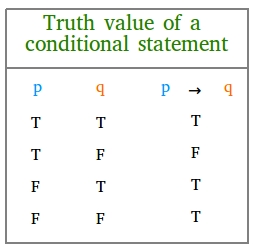Truth value of a conditional statement
The truth value of a conditional statement can either be true or false. In order to show that a conditional is true, just show that every time the hypothesis is true, the conclusion is also true.
To show that a conditional is false, you just need to show that every time the hypothesis is true, the conclusion is false. If you can find just 1 single example such that the hypothesis is true, but the conclusion is false, then the conditional is false.
In the table below, p is the hypothesis and q is the conclusion.
We denote the conditional " If p, then q" by p → q.

A few examples showing how to find the truth value of a conditional statement
Find the truth value of the following conditional statements.
Example #1:
If a man lives in the United States of America, then the man lives in North America.
The conditional is true. United States of America is a country in North America, so people who live in the United States of America live also in North America.
Example #2:
If the digit in the ones place of a number is 0, then the number is divisible by 10.
The conditional is true. According to the divisibility rule for 10, if the last digit or the digit in the ones place of a number is 0, then the number is divisible by 10.
Example #3:
If you live in Alaska, then the temperature is less than 100 degrees.
Alaska is usually very cold, so the first reaction may be to say that the conditional is true. However, the conditional is false. According to USA TODAY, the all-time record high temperature in Alaska is 100 degrees. This happened on June 27, 1915, in Fort Yukon.
Example #4:
If a number is divisible by 3, then the number is odd.
The conditional is false. The number 24 is divisible by 3, but 24 is not an odd number.
When the truth value of a conditional statement becomes mind-boggling.
The table above states that if the hypothesis is false and the conclusion is false, then p → q is true.
Take a look at the following conditional:
If 3 is even, then 3 + 1 is odd.
3 is even is false.
3 + 1 is odd is also false.
Why then is the conditional still true? It is true because the statement "Adding 1 to any even number will make the number odd." is a true statement. And that is the very essence of this conditional! We know 3 is not even, but suppose it is even for a second.
"If 3 were even, (even for a brief second), then 3 + 1 will be odd."